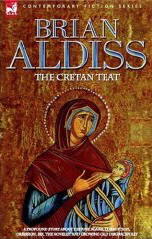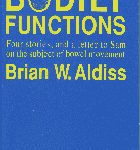Brian Aldiss writes:
Extract One. This is at the beginning of the novel, where the nameless, randy and ancient author (supposedly) of the novel first sees the Teat itself.
The scene is somewhere in the wild heart of Crete.
 The man who had led me to this particular olive grove, and this particular little chapel in the olive grove, reopened the chapel door for me. It was a low door, virtually a stable door. I’m a big chap. I had to bow low to enter. The threshold had probably been designed to induce humility.
The man who had led me to this particular olive grove, and this particular little chapel in the olive grove, reopened the chapel door for me. It was a low door, virtually a stable door. I’m a big chap. I had to bow low to enter. The threshold had probably been designed to induce humility.
The guide waited outside. He stood and smoked a cigarette.
Boris waited outside, ostentatiously patient. He dug his hands into his pockets and planted his right trainer on a stone, to stand there, leaning forward and whistling through his teeth. Boris had not acquired a taste for Crete’s Byzantine mysteries.
The daylight died almost as soon as it crept inside the chapel. The candle I had lit still burned on the small altar, in a little haze of darkness. My passion for the mysteries and intricacies of Byzantium awoke again. Of all the pasts of the world, it was the most alluringly rich and religious and corrupt. Its music began to play in my head, deep, masculine, monotonous.
I stood in a small room, maybe three metres by four. A cattle shed, little more – probably built by men who understood only cattle sheds. Rush-bottomed chairs clustered there, vacantly waiting. Having gathered for a chat about old times, they had found nothing to say. The chapel contained no ikonostasis; evidently the family who worshipped here were not the creme de la creme. Rather crude paintings adorned the walls, their holy images in blues and reds made indistinct through the erosion of neglect and the centuries. Smells of damp and aromas of candle, laced with the ghosts of incense.
This assemblage of objects of reverence had remained imprisoned in this stone cell since the Paleologues ruled in Constantinople. A family of Kyriotisa had built the chapel, to worship here, generation by generation, until something untoward had happened. Wealth and prayer had failed them. Those remaining had gathered up their garments and had cleared off, perhaps to Hania to start a new life.
Without its congregation, their chapel had died, their olive trees had embraced the grotesque.
Modern me, I unholstered my Olympus camera from its shoulder-bag, switching to flash. I focused on one particular painting, daubed on the irregular plaster.
The painting was of a woman nursing a child.
The woman’s eyes had been scratched out. In consequence, her face was almost obliterated. Mould and damp had destroyed other parts of the painting. Age had mottled the plaster like a living hand. The head of the babe the woman held could hardly be distinguished. Not that the Byzantine artist had ever been numbered among the masters of his calling. Nor had he, poor man, enjoyed an intimate knowledge of a woman’s anatomy. The breast the woman had produced for the babe’s nourishment was the size and shape of an aubergine, and protruded from her lower rib.
Above the painting the wording was clear: Agia Anna. Saint Anna.
Shutter clicked, flash briefly lit, like the flash of inspiration. And again. And once more, from a slightly different angle. Better get it right, chum. You’re not likely to come this way again.
Looking back now on that time, as Boris and I walked back up the hill, I remember I was happy. It’s a curious thing about happiness, that, unlike misery, it frequently eludes our awareness at the time; only later can we say, perforce using the past tense, “I was happy then”. It is hard to determine if this is because for much of our lives we are experiencing frustration, disillusion, boredom, or even pain. We never get enough practice at recognising happiness when its wings brush our lives.
As Boris, the guide, and I trudged up the stoney way to the guide’s car, we were shaded by gnarled olive trees, themselves witnesses to centuries past, the guide informed me that the saint’s eyes had been scratched out by Turkish invaders. His tone was both confident and confidential. The eyes represented witnesses to the Christian church, which should not be allowed to gaze on the rituals of Islam.
I contradicted him. My argument was that the damage could have been more recent. It was too easy, in all lands which had been under Ottoman rule until after the turn of the century, to blame the Turks for everything. Maybe the Communists, or maybe the Nazis, who had occupied Crete in the early forties, had desecrated the image. Or what about the superstitious? – Those whose incipient blindness had moved them to scratch away the plaster of the saint’s pupils, dissolve it in water, and drink it?
My faith in all these ideas was not strong, being unsupported by evidence; or maybe I presented the guide with too many alternatives. He continued to insist the damage had been done by the Turks. The Turks were somehow to blame for the awful poverty that had recently befallen this entire area.
I fell silent. Why should I challenge his beliefs? He lived by them. It was his country. The man was not a fool. I was the fool. We both fell silent, contemplating, no doubt, my foolishness.
But I was the one with the photos. And the one with the idea for the novel. I was the one who was going to get rich – okay, rich by his standards… We walked companionably up the steeply winding track together. Boris followed us. The day was hot. The afternoon was long.
We reached the guide’s car, left by the side of the road. He drove us back into Kyriotisa. There we sat outside a taverna in the shade and drank a glass of retsina from Hania, away over the mountains.
Brian Aldiss writes:
Extract Two. After many vicissitudes, and interfering with the actions of the protagonists in the novel, the nameless author is back in London
and forced to confront his publisher.
I must say in my own defence that being down on one’s luck is fairly normal for writers. That is, real writers who write only novels and short stories and do not appear on chat shows or TV quizzes, or generally hold forth as if they know it all. It isn’t everyone who can improve the world.
At the time I met Kathi, I was seeing not only my doctor but, even worse, my publisher. The doctor gave me some pills for my legs and a consoling word about my virility. To wit, “Don’t worry about it. Many men of your age can’t get it up any more.”
It was not a good time. One should be in high spirits when meeting one’s publisher. Kathi’s criticism of me had hurt. No matter what she thought of me, there was my writing to plead my case. I couldn’t help thinking of Samuel Johnson’s words to the Earl of Chesterfield, “No man is well pleased to have his all neglected, be it ever so little”. Be it ever so little…Johnson must have had me in mind when holding forth.
Wilberforce Large’s offices were situated in an inconvenient part of London, on the third floor of a big thirties office block. There lived my editor, Sam Bell, in a small office with a formidable number of typescript bundles near at hand. I liked Sam. Sam had attended my old college in Oxford, although ten years after I had left, under what my friends described as ‘a cloud’. Indeed, in happier days, I had often taken Sam for a drink, instead of sponging off him, the way authors usually do to their publishers.
I took the Northern Line tube to East Finchley, a long wearisome journey. I read The Victor Hugo Club on the way. And I wished I had had my hair cut, so as to look less run down. Once at East Finchley, I had to walk to Muswell Hill Broadway, since there seemed to be no buses running. Rain began to fall. A bit like King Lear, I had no coat or umbrella offering me protection.
As the rain came on determinedly, I thought perhaps I would afford a taxi; but the few taxis that passed were all taken. After all, what do you expect? I bought a tabloid newspaper at a newsagent to protect my head.
I was wet and miserable by the time I got to the Broadway.
A curious thing happened as I entered the rather dark lobby of the Wilberforce Large building, with its damp and muddy floor. There in one corner, by the lifts, was the very same naked dancer I had seen in the Clairville Gardens Hotel. Not a thing on, except for the bracelets which she still wore. She waggled her hips and shook the bracelets above her head in a most enticing way.
I had scarcely had the chance for a good look when the lift descended, some fool burst out with a parcel under his arm, and the girl was gone.
Mystified, I went up to see Sam, damp and downcast.
Of course I was aware that I had missed the date on which my contract said I should have completed and delivered the novel. But writers were always doing that. Publishers rarely noticed or cared; they always had too many books on hand, and were perhaps relieved if one or more dropped out. But as a punctilious writer of the old school, I always tried to be on time. To maintain Sam’s goodwill, I had got my agent to send him the first hundred pages of the novel, as a promise, a bonne bouche, a testament to my ability still to crop regularly.
Sam met me at the lift on the third floor and shook my hand.
“You’re bit damp, old boy. No taxis?”
“Sam, who was that naked girl dancing in your foyer?”, I asked. “She wasn’t a writer, was she?” I thought some pop singer might have been selling Sam her confessions.
He regarded me blankly. “Are you joking? Come into my office, will you? Would you like a coffee?”
“It wasn’t a ghost, was it?”
“Of course not.” I saw by the look on his face that he thought I had been drinking. The best idea seemed to be to drop the subject.
I settled in one of his very low modern chairs, to mop my neck with my handkerchief. I would solve the problem of getting out of it later. We chatted for a bit, mainly about “Sometimes I Won”, the memoirs of, and the repellent personality behind, a well-known politician. I had known this political person vaguely up at Oxford, and contributed an anecdote about how he had been smoking a ciggie – as we all did in those far off days – and had set light to his clothes in a drunken bout.
Sam took up a typescript I recognised as mine and wagged it at me. “You have here a very strong theme, about Langstreet and his endeavours to promote a religious cult in – where is it? Greece?”
“Crete.”
“Crete. Right. Obviously. But I’m bound to say…Well, you do rather pad out the story with your own adventures. Amatory adventures. It’s a bit boastful, I find, if not irrelevant. For instance, on page -”
“Hang on, how do you mean, boastful? I am quite frank about being a rather unsuccessful ladies man. I am in my seventies, you know, and often feel it. What do you expect?”
“All these encounters with women. It’s obvious they are made up.” “Not at all. The world is full of mature women looking for a flutter.”
“Mm. Foreign women, would you say?”
He was silent for a moment, listlessly turning over the pages. “I do slightly worry about the inconsistences. At one point you say you are impotent. Yet you seem to manage well enough with – who is it? – yes, Ingrid, the Swedish bit.”
“Someone else on the flutter.” I wasn’t going to tell him what hell it was never knowing on what occasions you would be able or not to get an erection. Research had shown it worked a bit better with a new woman. And there was Viagra, the blessed new panacea for the old and randy. I had in fact talked over this painful matter with Ingrid; but I wasn’t going to go into the problem in depth in a publisher’s office. (Incidentally, I don’t think I met any woman who was put out by my condition; most of them had met limp male organs before, it turned out. My appearance forewarned them against disappointment; they could see I was pretty ancient. In any case, it’s always nice to be in bed with an amusing member of the opposite sex.) “She wasn’t Swedish. It was her husband who was Swedish. Sven.”
After a pause, he said, “Then there’s this other business.” “The teat?”
“Not the teat. The cunnilingus. Some readers will be disgusted. You’re always going down on women.”
“I’ve done some research into cunnilingus, Sam. In the British Library, I mean, as well as on the hoof.” I tried to explain how, when it came to soixante-neuf situations, by far the majority of instances in nineteenth and early twentieth century porn were exclusively about fellatio. That’was the case in both written and pictorial porn. Women had to do it to men but men rarely reciprocated. It was considered unclean.
“It’s come into its own of recent decades.” I said.
“Enormous progress in standards of hygiene have been made, even in the years since the last world war. Personally, of course, but also in the laundering of clothes. An immense variety of cosmetics, perfumes, deodorants, have come on the market. All of which have made our intimate parts less welcome homes for bacterial hordes. It has become a pleasure – a, a connoisseur’s pleasure, to go down on a woman.
“And of course there is the one undeniable human improvement made in the murky waters of the twentieth century. I mean, the improvement in the status of women. Women are seen at last as man’s equals, not his servants or inferiors. His equals in desire. Cunnilingus is to be celebrated. Lesbians will tell you. Its popularity is a mark of the better times in which we live.”
“Foreign women, would you say?”
His question made me feel he was not attending.
“I might also add that most women anywhere adore it. It’s pleasant for both parties – as an aperitif, if not as the main course.”
“Why don’t you go and live on the Continent?”, Sam asked.
The question silenced me for a moment, much as a clout round the ear will silence an obstreperous child. Perhaps my enthusiasm had run away with me. I could not determine whether or not there was an unpleasant racist twist to Sam’s question.
“Well, isn’t that another way in which life – at least in England – has improved?”, I said, trying to keep a whine from my voice. “We’re not as xenophobic as formerly, are we? Foreign is as foreign does. Perhaps we owe much of our loss of sexual inhibition to what you might call foreigners. As our eating habits have become more varied and exotic and enjoyable, so have our sexual habits.”
Sam sighed and took a gulp from his coffee cup. Then he spoke impatiently.
“You may argue that. But it’s going to upset a lot of readers. It’s just pornography. It’s not everyone who finds this habit of yours enjoyable. Good old straight intercourse is certainly good enough for me.”
” Yes, ‘If it was good enough for my father, then it’s good enough for me’, eh, Sam? No, muff-diving, as our American friends tend to call it, has long been a sophisticated pleasure. How it thrills your partner! And the joy of having those trembling white thighs embrace your cheeks! Why, there’s –”
He was half-heaving himself from his chair. “Steady, old boy, that’s enough. I’ve heard enough. Your jacket’s steaming! You’ll catch fire!”
I subsided. “Catch cold, more like. It’s such hell getting here.”
“Well, simply hire a cab… No problem…You hire a cab.” He spoke in a soothing voice, as to a juvenile, bound to irritate, spacing his words – you pause hire pause a pause cab.
“All I’m saying is that muff-diving is one more colour on the palette and palate of love. One has to add that not all snatches invite visual or glossal enjoyment. They vary in looks and tastes.”
I was vexed with myself for using the term ‘snatch’; it was not a word I usually employed. I sighed heavily. “Also, the face is important. A beautiful face implies… well, you imagine there’s a – well, a correlation…”
Sam was becoming more gloomy as I spoke. He adjusted his tie, using the action as an excuse for shaking his head. “I mean, if you take Hedy Lamarr…” But I dared not blunder on to the end of the sentence. It struck me, perhaps belatedly, that neither of us was greatly enjoying the conversation.
I became afraid he might bring up the absurd paedophile charge next.
Sam now looked as if professionally involved in a Gloom Promotion Campaign.. He squared up my pages by holding them upright and banging the lower edges against his desk top; after which, he laid them aside with a moue of distaste..
“I suppose this teat-sucking is all part of this sucking obsession of yours,” he said – I thought in a rubbishly way.
Trying to make light of it, I replied that muff-diving was less an obsession than a question of taste; or a matter of last resort. However old and incapable one grew, one still had a tongue in one’s head.
Apparently he had not heard. “All right. I take your argument, but it’s not a good idea to air your obsessions in public.”
“You mean like Joyce did? And Hemingway? And Kafka? And –”
“I mean that, in your case, I don’t think it works at all well.”
We sat looking at each other, like picnicers staring out from under umbrellas at heavy rain. Perhaps he felt that I might feel he was a dull fellow when it came to sex – as indeed I did. Jerking suddenly into an assumed gaiety, he said, “Heard a good joke going the rounds the other day – kind of thing you might enjoy. About how you should seduce a member of the opposite sex. If you’re a man, you’ve got to be sincere, worship the dear creature, buy her clothes, send her flowers and a naughty novel – not too naughty! – take her to expensive restaurants, and so forth. Then she may yield. Whereas…” He paused, his heavy face imitating a smile. “Whereas, if you’re a woman, all you have to do is turn up naked with a bottle of Scotch under your arm.”
“Ha ha,” I roared. I had used that joke myself, several years before, in “The Banners of Barabas.” It had not been very funny then.
Solemnity was quickly restored. Sam laid a hand, as if in paternal blessing, on my pages of typescript. “But I fear we are going to have to pass on this one, old boy… Sorry. I have discussed it with my co-editor. Try something else for a change. We are currently planning a new series of guide books. The Large Little Guides. You wouldn’t like to do one on Crete, would you?”
“Instead?”
He nodded. “Instead.”
Vasari’s doomy words about the painter Perugino echoed in my memory. “With the terror of poverty constantly preying on his mind, he undertook, in order to earn money, such work as he would probably not have looked at, had he had the means to live.”
Saying I would think about it, I returned to the outside world and the persistent rain. The tabloid collapsed soggily about my head.





